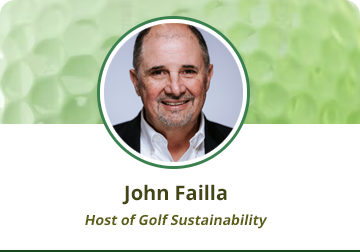Demand is off the charts right now. Everything is getting more expensive. Many golf courses need major improvements. Green fees will have to go up to cover these things. Jay shares how golf course owners and operators must balance the financial pressures of economic sustainability with the desire for environmental and social sustainability efforts in this important conversation.
Jay Karen, CEO of the National Golf Course Owners Association, addresses economic and social sustainability from the viewpoint of an owner/operator. Jay believes that there’s a fine balance between sustainable business practices and sustainability practices. He dissects the nuances one has to consider.
Demand is off the charts right now. Everything is getting more expensive. Many golf courses need major improvements. Green fees will have to go up to cover these things. Jay shares how golf course owners and operators must balance the financial pressures of economic sustainability with the desire for environmental and social sustainability efforts in this important conversation.
Topics covered:
- Jay’s career journey and current role as CEO at NGCOA [2:04]
-
-
- After graduating high school, Jay moved to Charleston to get a degree in history and become a high school teacher (coaching cross country in the fall and golf in the spring).
- During this time, he got a part-time job working at the NGCOA, where he stayed until 2007. He left to become the President and CEO of the Professional Association of Innkeepers International.
- He was recruited back to NGCOA in 2015 to be the CEO.
- The different types of members at NGCOA [5:25]
-
-
- NGCOA was created from a small task force of men and women who owned public golf courses. It now has over 4,000 members.
- NGCOA members include owners, operators and general managers of daily-fee, semi-private, private and resort courses (everyone from Pebble Beach to 600+ private clubs).
- The NGCOA engages in advocacy work (public policy and government affairs work) for its members.
- How NGCOA approaches sustainability [8:16]
-
-
- The NGCOA first looks at sustainability through the lens of economic sustainability because, without economic stability, there are no golf courses.
- They work closely with the GCSAA to address environmental issues and hold a seat on the board of the National Alliance of Accessible Golf to make sure their courses are open to those with disabilities.
- Decades ago, the NGCOA recognized that the supply and demand curve would be out of balance. So they started a program called, “Get Linked to Play Golf,” focused on creating diversity in golf.
- In Fall 2022, they hosted an event called, “Lead Golf Together,” to have conversations and action around changing diversity in C suites and board rooms in the golf industry.
- How different types of courses think about sustainability [17:15]
-
-
- The more high-profile you are, the more likely you are to participate in sustainability. If these types of organizations ignore environmental sustainability, it’s their own PR peril.
- Higher-profile golf courses face a lot of pressure to be pristine and perfect. Historically speaking, that meant paying attention to whatever delivered a perfect golf course.
- Municipal golf courses focus on sustainability because they're government-run. They’re responsible to their citizens.
- If a city makes a commitment sustainability, that cascades to city entities, such as municipal golf courses.
- The democratization of access to the game [29:50]
-
-
- NGCOA has spent decades trying to get more women in golf. They’ve also worked with the PGA to create a self-audit for golf courses to determine accessibility and diversity.
- What about those who can’t afford to play the game of golf? Jay emphasizes that as long as there have been municipal golf courses, it’s never been a rich-man-only game.
- Youth on Course facilitates $5 rounds of golf but the golf owner is made “whole” behind the scenes. There are plenty of similar programs that golf owners and operators can be part of to make golf more accessible.
- How do we work together toward sustainability? [36:12]
-
-
- Off-course golf (i.e. Topgolf) is a great way for someone to pick up a stick, learn the game of golf, and have fun. It’s creating accessibility in the perfect cultural environment—but how do we migrate them to the outdoor experience?
- South Korea has golf cafes (simulator-based businesses) where kids learn the game of golf in a less-embarrassing environment.
- 25 years ago, the NGCOA organized “Golf 20/20,” an initiative to get people to play the game of golf. Over that time, through the collective effort, many programs were developed that exist today.
- What drives Jay? Why is he passionate about golf sustainability? [40:39]
-
- When applying to be in the Peace Corps, Jay took a personality test that described him as a “gardener.” He laughed because he’s always been fascinated by taking land and helping it produce fruit. He’s naturally driven to take something dormant and make something of it.
- Jay is also driven toward fairness. Is there fair treatment in the government? In market forces? Golf is rarely seen as the underdog but he points out that golf often is when it comes to advocacy. He makes sure that public policy treats golf courses fairly.
- Jay is inspired by doers. He’s inspired by people who will drop what they’re doing and show up to get a job done.
Resources & People Mentioned
Connect with Jay Karen
Connect With Golf Sustainability
Subscribe to Golf Sustainability
Note: Timestamps provided are approximate.
Thank you for listening to the Golf Sustainability podcast. If you found this episode interesting, don’t forget to subscribe and leave a review! For more insights and updates on sustainable energy solutions, visit our website and follow us on social media.


LISTEN ON